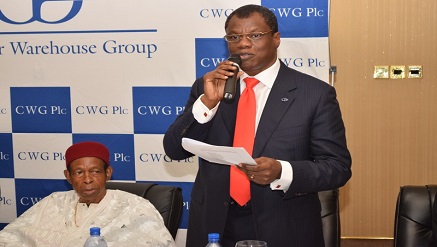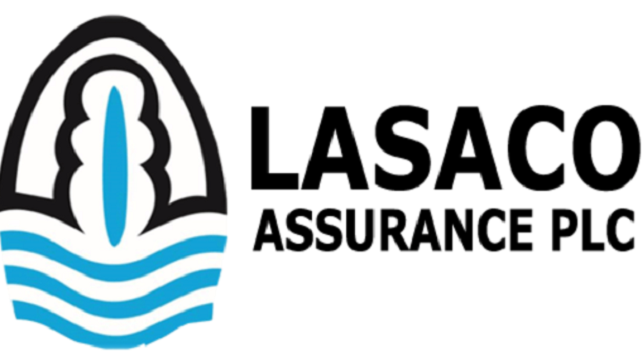News
CWG Can Be Next Google with CWG 2.0- Okere

Austin Okere, founder and chief executive officer, Computer Warehouse Group (CWG) Plc, has noted that the company has the potential to become the next Google, given the business prospects of her new business model, CWG 2.0.
The CWG boss made this point while addressing the company’s shareholders at the 9th Annual General Meeting (AGM) held in Lagos, recently.
In his opening statement, Chief Willie Belonwu, company’s chairman, observed that “ CWG Plc has been able to record strong top line financial figures in the past year, against a volatile backdrop of increments in commodity prices, tariffs and a steady depreciation of the local currency (at the interbank market), coupled with steady decrease in the margins of products and services. The results which showed strong and positive performances across all financial indices also confirmed the company’s position as the foremost Pan African ICT services Provider”
In reference to the future of the company, Belonwu noted that CWG Plc plans to further tap into the growth potentials of emerging African Economies, through the provision of cloud based IT solutions, in the bid to attain her vision to be the number 1 IT utility enabler in Africa.
The Company’s financial scorecard revealed that her revenues grew by 10% while Profit After Tax (PAT) increased by a whopping 81% showing strong efficiency of operations.
The result revealed a Return on Equity of 13% in 2013, as against 11% in 2012 and Returns on Capital Employed (ROCE) of 13% against 7% in 2012.
The Company’s Asset increased by N2bn to N13.4bn as at 2013 year end, while Shareholders’ equity increased by a remarkable 66% to N5.0bn in the same period.
The Company finished with a strong cash position of over N1.1bn at the year end, with a 38% increase in cash from operation over 2012.
Shareholders at the event were informed of the payment of their 8 kobo dividends per unit share, the same day.
According to Okere, CWG 2.0 is a subscription business model and driven by the quest to help Small Medium Enterprises (SMEs) grow and make notable social impact.
This includes Openshopen, a website that affords shop owners open their own virtual store online and SMERP, an enterprise resource planning solution that will help business owners manage their business inventories on a subscription basis.
According to him, Openshopen will allow business owners to open their own online virtual stores which will give their businesses visibility leverages.
“If a buyer searches for a shop that sells spare parts in your location online, for example, he can get to see your store address and get to buy from you without any stress, if you have registered your presence online” he said.
Moreover, the solution will democratize domain possession and give Micro, Small and Medium business owners the platform to compete with known online stores at cheaper rates.
Okere also pointed out that these solutions will have significant social impacts on the society. According to him, there are about 17.7 million Micro, Small and Medium Enterprises (MSME) in Nigeria.
“With their own online stores and with the aid of enterprise resource planning, we will empower SMEs to be able to keep their own records. Then, they can present their records to get credits from the banks. With these loans, they can be able to expand their businesses. If they are able to expand their businesses, each of them can employ one more person.
“If each of them employs one more person, we will end up creating 17.7 million more jobs. The unemployment rate in Nigeria is about 23%, which amounts to about 16 million jobless youths. With this development, we will eradicate unemployment and have more jobs to spare” he added.
The advent of CWG 2.0 has positioned us to be next Google or Facebook and make significant global impact.
And this vision is attainable because our solutions are not only profitable but they are repeatable, scalable and sustainable. He concluded.
The event also witnessed the election of Mr. Emmanuel Ijewere to the board of directors as a Non-Executive Director.
Ijewere is an astute accountant, who had served as president to various notable organizations, such as the institute of Chartered Accountants of Nigeria (ICAN), Red Cross Society, Institute of Directors and others.
In the same vein, three other shareholders were also elected as members of the audit committee, while Ernst and Young was appointed as the company’s auditor for another year.
The event had in attendance the company’s Chief Operating Officer, Mr. Phillip Obioha, Chief Technology Officer, Mr. James Agada; Non-Executive Directors, Mr. AbiodunFawunmi and Mr. Ravi Sharma, represented by Alternate Director, Mr. kunleAyodeji; company Secretary, Barrister OkeyEjibe, shareholders, the media and other stakeholders.
News
How and Why N210 Trillion is Missing in NNPCL – CFO

Adedapo Segun, chief financial officer (CFO), Nigerian National Petroleum Company Limited (NNPC), has explained why there is a missing sum of N210 trillion in the company’s audited financial statement spanning from 2017 to 2023.

According to Segun, the missing funds are cash calls requested by joint venture (JV) partners and settlement to the JVs.
He spokeat a session of the Senate Committee on Public Accounts chaired by Aliyu Wadada.
Segun was responding to an alarm raised by the committee over missing N210 trillion in NNPCL’s audited financial statement.
Recall that Wadada issued a one-week ultimatum to NNPCL to account for the missing N210 trillion.
Reacting, Segun said, “The N103 trillion and N107 trillion are made up of joint venture cash calls that have been requested by the JV operators and JV cash call payments made by NNPCL, which are yet to be reconciled because governance procedures were not done at that time.
“That is why you see the description reflecting those two items would be washed out because they are two sides of the same transaction, which is the cash calls by JV partners and the settlement by NNPCL.”
However, Habu Sadeik, a financial analyst, in a post on X on Thursday, said Segun’s response was unsatisfactory.
Saidik faulted NNPCL’s response about the fund discrepancies, noting that something is not right with the audited financial statement.
“Forget about the senators’ lack of knowledge.
“The CFO’s response is not satisfactory. Are you saying that cash calls worth hundreds of trillions are just appearing on your FS only in 2024 without 31 disclosure?
“If it’s a cash call, why hasn’t the disclosure said so?
“Which cash call is over 100 trillion?
“Something is definitely not right, and I hope they retrospectively correct that FS.
“Someone somewhere did a chef’s work,” he wrote on X.
News
PalmPay, Glo Launch “Recharge and Win Bonanza 2” with Exciting Prizes

PalmPay, Nigeria’s leading fintech company, has partnered with Globacom to launch the second edition of the “Recharge and Win Bonanza” campaign. The promotion, which runs from June 19th to August 8th, 2025, offers Nigerians the chance to win amazing prizes when they purchase Glo airtime and data via the PalmPay app.

According to a joint statement by PalmPay and Globacom, “A weekly live raffle draw will be held and streamed on PalmPay’s official social media channels throughout the campaign. Customers who make Glo transactions through the PalmPay app will be eligible to win prizes, including the iPhone 15 Pro, Infinix Hot 40, and other exciting items”.
To participate, interested customers can log onto http://bit.ly/PalmPaySms .
The statement added that all transaction above N500 gives participants an extra shot at winning, adding that daily social media challenges will also offer participants a chance to win cash prizes.
Additionally, PalmPay users can enjoy up to 6% cashback when they buy Glo airtime and data through the PalmPay app. As an added bonus, customers who have not subscribed to a Glo data plan in the last 90 days will receive a 100% bonus on their recharge during the campaign period.
Wayne Ruppel, Head of Billers at PalmPay Limited expressed excitement about the partnership, stating that, “This collaboration is a major step in our mission to deliver MORE – more support, more rewards, and more innovation to our customers.
Partnering with Glo, a leader in the telecommunications sector, is a testament to our shared commitment to improving everyday experiences for all Nigerians. We are excited to reward our users and encourage everyone to take full advantage of this exciting opportunity.
Globacom also expressed delight at creating additional value for its subscribers through unique customer-appreciation schemes.
“Our partnership with PalmPay on the “Recharge and Win Bonanza perfectly underscores our commitment to delivering exceptional value and experiences. Over the years, we have always sought innovative ways to enrich the lives of our customers. We, therefore, enjoin our subscribers to utilize the opportunity provided by the bonanza and enjoy the many benefits it offers”, the company stated.
PalmPay and Glo will collaborate throughout the campaign period to deliver exceptional customer experience, reward loyalty, and reinforce their shared mission to make digital transactions more accessible, rewarding, and secure for millions of Nigerians.
News
Lasaco Assurance to Invest in Technologies, Systems to Deliver Value to Clients

Lasaco Assurance Plc, has said it would continue to invest in technologies and systems that delivers tangible value to clients and drive industry innovation.

Mr Abiodun Razzaq, Managing Director of Lasaco Assurance, who stated this at the 2025 customer forum organised by the company for its northern region customers in Abuja, said the forum’s interactive session offered an invaluable platform for open and constructive dialogue.
He said the forum brought together a distinguished assembly of customers, including policyholders, brokers, corporate clients, and industry partners, to engage in a robust dialogue aimed at enhancing service delivery and aligning offerings with the evolving expectations of the Northern market.
In his opening remarks, Regional Manager (Northern Region), Lasaco Assurance, Mr. Kunle Hamza underscored the company’s unwavering dedication to stakeholder engagement as a foundational pillar of its growth strategy. He emphazised that customer insights remain integral to shaping policies, refining service processes, and reinforcing the company’s brand promise.
He provided a compelling overview of Lasaco assurance’s recent performance and strategic priorities. He highlighted the company’s consistent premium income growth, bold digital transformation agenda, and ongoing operational restructuring designed to ensure responsiveness and resilience in a dynamic insurance landscape.
Addressing the customers, Mr. Adedayo Adetokun, Head of Strategy, affirmed that Lasaco assurance was actively developing multiple digital platforms to cater forvarious customer segments—part of a broader digital innovation roadmap that positions the company for future growth. He noted that human capital development was also being prioritised with targeted investments in talent acquisition and training to enhance operational capacity.
In his closing remarks, Mr. Muyiwa Anwoju, General Manager, Sales, expressed the management’s deep appreciation for the feedback received.
He assured participants that all contributions would be meticulously reviewed, categorised, and integrated into the company’s improvement plans. According to Anwoju, this forum marks the beginning of a renewed customer engagement framework, one that would be expanded across other regions in due course.

 Telecom2 days ago
Telecom2 days agoALTON Clarifies on Migration to End-User Billing for USSD Services

 News3 days ago
News3 days agoDigital Africa Global Consult, NDPC Partner on Ground-Breaking “Nigeria Data Challenge” Initiative

 E-Financial2 days ago
E-Financial2 days agoNigerian Stock Market Suffers ₦183 Billion Loss Amid Profit-Taking

 News2 days ago
News2 days agoDStv Rewards Loyal Customers with Free Package Upgrades

 Telecom2 days ago
Telecom2 days agoLagos Future Conference 2025: Stakeholders Call for Digital Responsibility and Grassroots Innovation

 General News2 days ago
General News2 days agoAfrican Parliamentarians Seek Answers from Telcos on Quality of Service

 E-Financial2 days ago
E-Financial2 days agoSEC Working on Stablecoin Regulation Framework

 News2 days ago
News2 days agoFCCPC Orders Air Peace to Appear Over Alleged Refund Violations




























